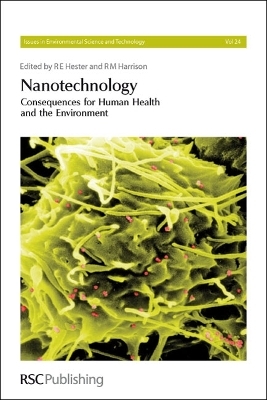
Nanotechnology
Royal Society of Chemistry (Verlag)
978-0-85404-216-6 (ISBN)
- Titel ist leider vergriffen;
keine Neuauflage - Artikel merken
Nanotechnology is a much talked about, and rapidly expanding area of science, which is sometimes little understood. It looks set to make a significant impact on human life and, with numerous commercial developments emerging, will become a major industry over the coming years. Nanotechnology can be broadly described as developing or exploiting products at nanometre dimensions (i.e. as having one dimension less than 100 nanometres). Such materials have a larger surface area to volume ratio than conventional materials which provides them with an increased level of reactivity, and consequently, toxicity per unit mass. This book sets the subject into context by first of all describing the current range of products containing nano-materials and then looking at the consequences for the environment and human health relating to the introduction of nanoparticles and nano-tubes. Nanotechnology: Consequences for Human Health and the Environment discusses some of the more controversial issues associated with the field including: nanoparticles in the environment, occupational exposure, toxicological properties, human health issues and safety. This authoritative and comprehensive book will be of interest to both scientists and technologists but also to regulators and government. This title is also available in hardback.
The series has been edited by Professors Hester and Harrison since it began in 1994. Professor Roy Harrison OBE is listed by ISI Thomson Scientific (on ISI Web of Knowledge) as a Highly Cited Researcher in the Environmental Science/Ecology category. He has an h-index of 54 (i.e. 54 of his papers have received 54 or more citations in the literature). In 2004 he was appointed OBE for services to environmental science in the New Year Honours List. He was profiled by the Journal of Environmental Monitoring (Vol 5, pp 39N-41N, 2003). Professor Harrison’s research interests lie in the field of environment and human health. His main specialism is in air pollution, from emissions through atmospheric chemical and physical transformations to exposure and effects on human health. Much of this work is designed to inform the development of policy. Now an emeritus professor, Professor Ron Hester's current activities in chemistry are mainly as an editor and as an external examiner and assessor. He also retains appointments as external examiner and assessor / adviser on courses, individual promotions, and departmental / subject area evaluations both in the UK and abroad.
Current and Future Applications of Nanotechnology: 1: Introduction; 2: Technology; 3: Types of Nanomaterials; 4: Bio Applications; 5: Nanocatalysts; 6: Nanotechnology Reports; 7: Future Opportunities; 8: Nanomaterials Companies; 9: Future; References; Nanoparticles in the Aquatic and Terrestrial Environments: 1: Introduction; 2 Overview of Current Knowledge; 3: Fate and Behaviour in Natural Aquatic Systems; 4: Issues to be Addressed; 5:Conclusions; References; Nanoparticles in the Atmosphere: 1: Introduction; 2: Sources of Atmospheric Particles; 3: Particle Size Distributions; 4: Measurement of Nanoparticles in Roadside Air; 5: Transformation and Transport of Ultrafine Particles; 6: Measurements of Particle Number Concentration in the Atmosphere; 7: Chemical Composition of Atmospheric Nanoparticles; 8: Indoor/Outdoor Relationships of Nanoparticles; 9: Conclusions; References; Occupational Exposure to Nanoparticles and Nanotubes: 1: Introduction; 2: Scientific Framework for Assessing Exposure to Nanoparticles; 3: Review of Methods for Assessing Exposure to Nanoparticles 4: Review of Reported Measurements of Exposure to Nanoparticles; 5: Discussion; References; Toxicological Properties of Nanoparticles and Nanotubes: 1: Introduction; 2: Environmental Air Pollution Particles; 3: Could Cardiovascular Effects of PM be due to CDNP? 4:Is the Environmental Nanoparticle Paradigm Applicable to Engineered NP? 5: Conclusion; References; Human Health Effects of Nanoparticle Exposure: 1: The Regulatory Issues; 2:Current Issues and Knowledge Gaps; 3: Discussion: Risk Assessment of Engineered NPs; References; Nanoparticle Safety: a Perspective from the United States; 1: Introduction; 2: The US National Nanotechnology Initiative; 3; Federal Government Activities in Support of "Safe" Nanotechnology 4; Industry and Other Non-government Activities in Support of "Safe" Nanotechnology; 5: Looking to the Future - Ensuring the Development of "Safe" Nanotechnology; References; Subject Index
| Erscheint lt. Verlag | 27.6.2007 |
|---|---|
| Reihe/Serie | Issues in Environmental Science and Technology ; Volume 24 |
| Zusatzinfo | Not illustrated |
| Verlagsort | Cambridge |
| Sprache | englisch |
| Maße | 156 x 234 mm |
| Themenwelt | Studium ► Querschnittsbereiche ► Prävention / Gesundheitsförderung |
| Naturwissenschaften | |
| Technik ► Umwelttechnik / Biotechnologie | |
| ISBN-10 | 0-85404-216-4 / 0854042164 |
| ISBN-13 | 978-0-85404-216-6 / 9780854042166 |
| Zustand | Neuware |
| Informationen gemäß Produktsicherheitsverordnung (GPSR) | |
| Haben Sie eine Frage zum Produkt? |
aus dem Bereich


